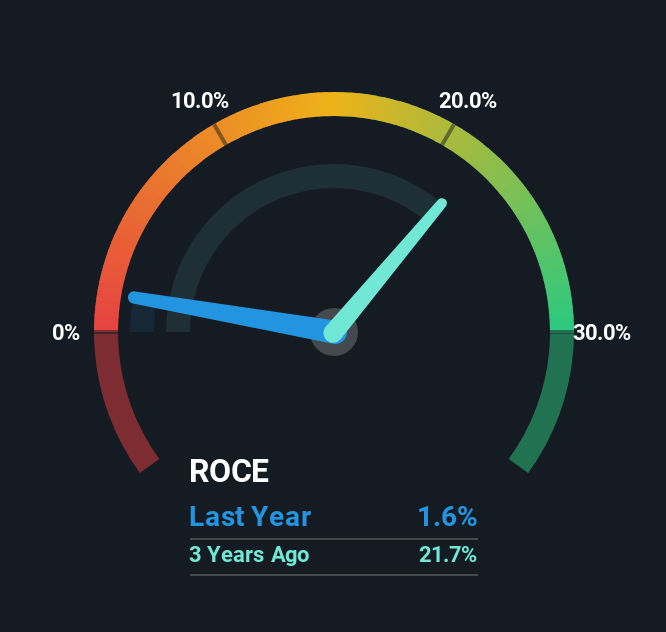- Saudi Arabia
- /
- Chemicals
- /
- SASE:2310
Some Investors May Be Worried About Sahara International Petrochemical's (TADAWUL:2310) Returns On Capital
When we're researching a company, it's sometimes hard to find the warning signs, but there are some financial metrics that can help spot trouble early. More often than not, we'll see a declining return on capital employed (ROCE) and a declining amount of capital employed. Basically the company is earning less on its investments and it is also reducing its total assets. In light of that, from a first glance at Sahara International Petrochemical (TADAWUL:2310), we've spotted some signs that it could be struggling, so let's investigate.
Understanding Return On Capital Employed (ROCE)
If you haven't worked with ROCE before, it measures the 'return' (pre-tax profit) a company generates from capital employed in its business. The formula for this calculation on Sahara International Petrochemical is:
Return on Capital Employed = Earnings Before Interest and Tax (EBIT) ÷ (Total Assets - Current Liabilities)
0.016 = ر.س309m ÷ (ر.س21b - ر.س2.5b) (Based on the trailing twelve months to March 2025).
Thus, Sahara International Petrochemical has an ROCE of 1.6%. Ultimately, that's a low return and it under-performs the Chemicals industry average of 3.8%.
Check out our latest analysis for Sahara International Petrochemical

Above you can see how the current ROCE for Sahara International Petrochemical compares to its prior returns on capital, but there's only so much you can tell from the past. If you're interested, you can view the analysts predictions in our free analyst report for Sahara International Petrochemical .
What Can We Tell From Sahara International Petrochemical's ROCE Trend?
In terms of Sahara International Petrochemical's historical ROCE movements, the trend doesn't inspire confidence. About five years ago, returns on capital were 3.1%, however they're now substantially lower than that as we saw above. On top of that, it's worth noting that the amount of capital employed within the business has remained relatively steady. Since returns are falling and the business has the same amount of assets employed, this can suggest it's a mature business that hasn't had much growth in the last five years. So because these trends aren't typically conducive to creating a multi-bagger, we wouldn't hold our breath on Sahara International Petrochemical becoming one if things continue as they have.

The Bottom Line
In summary, it's unfortunate that Sahara International Petrochemical is generating lower returns from the same amount of capital. However the stock has delivered a 63% return to shareholders over the last five years, so investors might be expecting the trends to turn around. In any case, the current underlying trends don't bode well for long term performance so unless they reverse, we'd start looking elsewhere.
On a separate note, we've found 2 warning signs for Sahara International Petrochemical you'll probably want to know about.
While Sahara International Petrochemical isn't earning the highest return, check out this free list of companies that are earning high returns on equity with solid balance sheets.
New: Manage All Your Stock Portfolios in One Place
We've created the ultimate portfolio companion for stock investors, and it's free.
• Connect an unlimited number of Portfolios and see your total in one currency
• Be alerted to new Warning Signs or Risks via email or mobile
• Track the Fair Value of your stocks
Have feedback on this article? Concerned about the content? Get in touch with us directly. Alternatively, email editorial-team (at) simplywallst.com.
This article by Simply Wall St is general in nature. We provide commentary based on historical data and analyst forecasts only using an unbiased methodology and our articles are not intended to be financial advice. It does not constitute a recommendation to buy or sell any stock, and does not take account of your objectives, or your financial situation. We aim to bring you long-term focused analysis driven by fundamental data. Note that our analysis may not factor in the latest price-sensitive company announcements or qualitative material. Simply Wall St has no position in any stocks mentioned.
About SASE:2310
Sahara International Petrochemical
Owns, establishes, operates, and manages industrial projects related to chemical and petrochemical industries in the Kingdom of Saudi Arabia.
Flawless balance sheet with reasonable growth potential.
Similar Companies
Market Insights
Community Narratives





